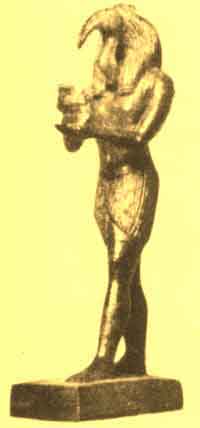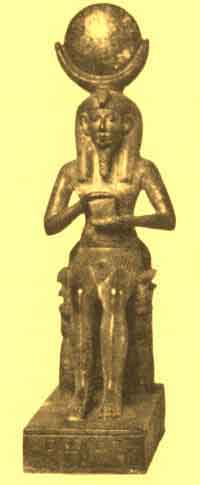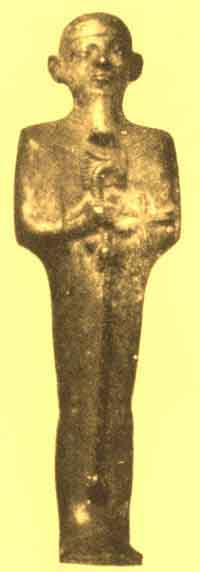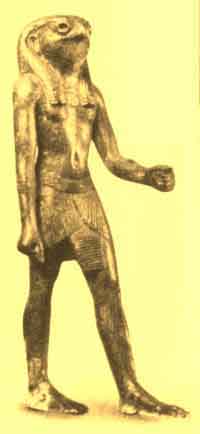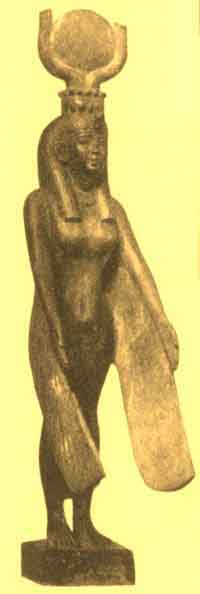
Egyptian Myth and Legend, by Donald Mackenzie, [1907], at sacred-texts.com
CHAPTER II
The Tragedy of Osiris
Osiris the Wise King--Introduction of Agriculture --Isis the Strong Queen--Conspiracy of Set--The Tragic Feast--Osiris is slain--The Quest of Isis----Set the Oppressor--"The Opener of the Ways"--Birth of Horus--Thoth the Healer--Tree encloses Osiris's Body--Isis as a Foster-mother--Her Swallow Guise--Flames of Immortality--Osiris brought back to Egypt --Torn in Pieces by Set, the Boar Hunter--Isis recovers Fragments--Ghost of Murdered King--Horus as Hamlet--Succession of Uncle and Son--Agricultural Rites--The Inundation--Lamentations at Sowing Time and Harvest --Osiris and Isis as Corn Spirits--Hapi, the Nile Deity--Isis as a Male.
WHEN Osiris was born, a voice from out of the heavens proclaimed: "Now hath come the lord of all things." The wise man Pamyles had knowledge of the tidings in a holy place at Thebes, and he uttered a cry of gladness, and told the people that a good and wise king had appeared among men.
When Ra grew old and ascended unto heaven, Osiris sat in his throne and ruled over the land of Egypt. Men were but savages when he first came amongst them. They hunted wild animals, they wandered in broken tribes hither and thither, up and down the valley and among the mountains, and the tribes contended fiercely in battle. Evil were their ways and their desires were sinful.
Osiris ushered in a new age. He made good and binding laws, he uttered just decrees, and he judged with wisdom between men. He caused peace to prevail at length over all the land of Egypt.
Isis was the queen consort of Osiris, and she was a
woman of exceeding great wisdom. Perceiving the need of mankind, she gathered the ears of barley and wheat which she found growing wild, and these she gave unto the king. Then Osiris taught men to break up the land which had been under flood) to sow the seed, and, in due season, to reap the harvest. He instructed them also how to grind corn and knead flour and meal so that they might have food in plenty. By the wise ruler was the vine trained upon poles, and he cultivated fruit trees and caused the fruit to be gathered. A father was he unto his people, and he taught them to worship the gods, to erect temples, and to live holy lives. The hand of man was no longer lifted against his brother. There was prosperity in the land of Egypt in the days of Osiris the Good.
When the king perceived the excellent works which he had accomplished in Egypt, he went forth to traverse the whole world with purpose to teach wisdom unto all men, and prevail upon them to abandon their evil ways. Not by battle conquest did he achieve his triumphs, but by reason of gentle and persuasive speech and by music and song. Peace followed in his footsteps, and men learned wisdom from his lips.
Isis reigned over the land of Egypt until his return. She was stronger than Set, who regarded with jealous eyes the good works of his brother, for his heart was full of evil and he loved warfare better than peace. He desired to stir up rebellion in the kingdom. The queen frustrated his wicked designs. He sought in vain to prevail in battle against her, so he plotted to overcome Osiris by guile. His followers were seventy and two men who were subjects of the dusky queen of Ethiopia. 1
|
Thoth |
Asar-Ash (Osiris-Ah) with attributes of Khonsu |
Ptah |
|
Ra |
|
Set |
LUNAR, SOLAR AND EARTH GODS
|
Osiris |
Isis, winged, in the attitude of protecting Horus |
Horus |
OSIRIS, ISIS AND HORUS
When Osiris returned from his mission, there was great rejoicing in the land. A royal feast was held, and set came to make merry, and with him were his fellow conspirators. He brought a shapely and decorated chest, which he had caused to be made according to the measurements of the king's body. All men praised it at the feast, admiring its beauty, and many desired greatly to possess it. When hearts were made glad with beer-drinking, Set proclaimed that he would gift the chest unto him whose body fitted its proportions with exactness. There was no suspicion of evil design among the faithful subjects of Osiris. The guests spoke lightly, uttering jests one against another, and all were eager to make trial as Set had desired. So it happened that one after another entered the chest on that fateful night, until it seemed that no man could be found to win it for himself. Then Osiris came forward. He lay down within the chest, and he filled it in every part. But dearly was his triumph won in that dark hour which was his hour of doom. Ere he could raise his body, the evil followers of Set sprang suddenly forward and shut down the lid, which they nailed fast and soldered with lead. So the richly decorated chest became the coffin of the good king Osiris, from whom departed the breath of life.
The feast was broken up in. confusion. Merrymaking ended in sorrow, and blood flowed after that instead of beer. Set commanded his followers to carry away the chest and dispose of it secretly. As he bade them, so did they do. They hastened through the night and flung it into the Nile. The current bore it away in the darkness, and when morning came it reached the great ocean and was driven hither and thither, tossing among the waves. So ended the days of Osiris and the years of his wise and prosperous reign in the land of Egypt.
When the grievous tidings were borne unto Isis, she was stricken with great sorrow and refused to be comforted. She wept bitter tears and cried aloud. Then she uttered a binding vow, cut off a lock of her shining hair, and put on the garments of mourning. Thereafter the widowed queen wandered up and down the land, seeking for the body of Osiris.
Nor would she rest nor stay until she found what she sought. She questioned each one she encountered, and one after another they answered her without knowledge. Long she made search in vain, but at length she was told by shoreland children that they had beheld the chest floating down the Nile and entering the sea by the Delta mouth which takes its name from the city of Tanis. 1
Meanwhile Set, the usurper, ascended the throne of Osiris and reigned over the land of Egypt. Men were wronged and despoiled of their possessions. Tyranny prevailed and great disorder, and the followers of Osiris suffered persecution. The good queen Isis became a fugitive in the kingdom, and she sought concealment from her enemies in the swamps and deep jungle of the Delta. Seven scorpions followed her, and these were her protectors. Ra, looking down from heaven, was moved to pity because of her sore distress, and he sent to her aid Anubis, "the opener of the ways", who was the son of Osiris and Nepthys, and he became her guide.
One day Isis sought shelter at the house of a poor woman, who was stricken with such great fear when she beheld the fearsome scorpions that she closed the door against the wandering queen. But a scorpion gained entrance) and bit her child so that he died. Then loud and long were the lamentations of the stricken mother.
The heart of Isis was touched with pity, and she uttered magical words which caused the child to come to life again, and the woman ministered unto the queen with gratitude while she remained in the house.
Then Isis gave birth unto her son Horus; but Set came to know where the mother and babe were concealed, and he made them prisoners in the house. 1
It was his desire to put Horus to death, lest he should become his enemy and the claimant of the throne of Osiris. But wise Thoth came out of heaven and gave warning unto Isis, and she fled with her child into the night. She took refuge in Buto, where she gave Horus into the keeping of Uazit, the virgin goddess of the city, who was a serpent, 2 So that he might have protection against the jealous wrath of Set, his wicked uncle, while she went forth to search for the body of Osiris. But one day, when she came to gaze upon the child, she found him lying dead. A scorpion had bitten him, nor was it in her power to restore him to life again. In her bitter grief she called upon the great god Ra. Her voice ascended to high heaven, and the sun boat was stayed in its course. Then wise Thoth came down to give aid. He worked a mighty spell; he spoke magical words over the child Horus, who was immediately restored to life again. 3 It was the will of the gods that he should grow into strong manhood and then smite his father's slayer.
The coffin of Osiris was driven by the waves to Byblos, in Syria, and it was cast upon the shore. A sacred tree sprang up and grew round it, and the body of the dead ruler was enclosed in its great trunk. The king of that
alien land marvelled greatly at the wonderful tree, because that it had such rapid growth, and he gave command that it should be cut down. As he desired, so it was done. Then was the trunk erected in his house as a sacred pillar, but to no man was given knowledge of the secret which it contained.
A revelation came unto Isis, and she set out towards Byblos in a ship. When she reached the Syrian coast she went ashore clad in common raiment, and she sat beside a well, weeping bitterly. Women came to draw water, and they spoke to her with pity, but Isis answered not, nor ceased to grieve, until the handmaidens of the queen drew nigh. Unto them she gave kindly greetings. When they had spoken gently unto her she braided their hair, and into each lock she breathed sweet and alluring perfume. So it chanced that when the maidens returned unto the king's house the queen smelt the perfume, and commanded that the strange woman should be brought before her. Then it was that Isis found favour in the eyes of the queen, who chose her to be the foster-mother of the royal babe.
But Isis refused to suckle the child, and to silence his cries for milk, she put her finger into his mouth. When night came she caused fire to burn away his flesh, and she took the form of a swallow and flew, uttering broken cries of sorrow, round about the sacred pillar which contained the body of Osiris. It chanced that the queen came nigh and beheld her babe in the flames. She immediately plucked him forth; but although she rescued his body she caused him to be denied immortality. 1
Isis again assumed her wonted form, and she confessed
unto the queen who she was. Then she asked the king that the sacred pillar be given unto her. The boon was granted, and she cut deep into the trunk and took forth the chest which was concealed therein. Embracing it tenderly, she uttered cries of lamentation that were so bitter and keen that the royal babe died with terror. Then she consecrated the sacred pillar, which she wrapped in linen and anointed with myrrh, and it was afterwards placed in a temple which the king caused to be erected to Isis, and for long centuries it was worshipped by the people of Byblos.
The coffin of Osiris was borne to the ship in which the queen goddess had sailed unto Syria. Then she went aboard, and took with her Maneros, the king's first-born, and put forth to sea. The ship sped on, and the land faded from sight. Isis yearned to behold once again the face of her dead husband, and she opened the chest and kissed passionately his cold lips, while tears streamed from her eyes. Maneros, son of the King of Byblos, came stealthily behind her, wondering what secret the chest contained. Isis looked round with anger, her bright eyes blinded him, and he fell back dead into the sea.
When Isis reached the land of Egypt she concealed the body of the dead king in a secret place, and hastened towards the city of Buto to embrace her son Horus; but shortlived was her triumph. It chanced that Set came hunting the boar 1 at full moon in the Delta jungle, and he found the chest which Isis had taken back from Syria. He caused it to be opened, and the body of Osiris was taken forth and rent into fourteen pieces, which he cast into the Nile, so that the crocodiles might devour them. But these reptiles had fear of Isis and touched them not,
and they were scattered along the river banks. 1 A fish (Oxyrhynchus) swallowed the phallus.
The heart of Isis was filled with grief when she came to know what Set had done. She had made for herself a papyrus boat and sailed up and down the Delta waters, searching for the fragments of her husband's body, and at length she recovered them all, save the part which had been swallowed by the fish. She buried the fragments where they were found, and for each she made a tomb. In after days temples were erected over the tombs, and in these Osiris was worshipped by the people for long centuries.
Set continued to rule over Egypt, and he persecuted the followers of Osiris and Isis in the Delta swamps and along the seacoast to the north. But Horus, who was rightful king, grew into strong manhood. He prepared for the coming conflict, and became a strong and brave warrior. Among his followers were cunning workers in metal who were called Mesniu (smiths), and bright and keen were their weapons of war. The sun hawk was blazoned on their battle banners.
One night there appeared to Horus in a. dream a vision of his father Osiris. 2 The ghost urged him to overthrow Set) by whom he had been so treacherously put to death, and Horus vowed to drive his wicked uncle and all his followers out of the land of Egypt. So he gathered his army together and went forth to battle. Set came against him at Edfu and slew many of his followers. But Horus secured the aid of the tribes that remained faithful to Osiris and Isis, and Set was again attacked and driven towards the eastern frontier. The usurper uttered a
great cry of grief when he was forced to take flight. He rested at Zaru, and there was the last battle fought. It was waged for many days, and Horus lost an eye. But Set was still more grievously wounded, 1 and he was at length driven with his army out of the kingdom.
It is told that the god Thoth descended out of heaven and healed the wounds of Horus and Set. Then the slayer of Osiris appeared before the divine council and claimed the throne. But the gods gave judgment that Horus was the rightful king, and he established his power in the land of Egypt, and became a wise and strong ruler like to his father Osiris.
Another version of the legend relates that when the fragments of the body of Osiris were recovered from the Nile, Isis and Nepthys lamented over them, weeping bitterly. In one of the temple chants Isis exclaims:
Gods, and men before the face of the gods, are weeping for thee at the same time when they behold me!
Lo! I invoke thee with wailing that reacheth high as heaven--
Yet thou hearest not my voice. Lo! I, thy sister, I love thee more than all the earth
And thou lovest not another as thou dost thy sister!
Nepthys cries,
Subdue every sorrow which is in the hearts of us thy sisters . . .
Live before us, desiring to behold thee. 2
The lamentations of the goddesses were heard by Ra, and he sent down from heaven the god Anubis, who, with the assistance of Thoth and Horus, united the severed portions of the body of Osiris, which they wrapped in linen bandages. Thus had origin the mummy form of the god. Then the winged Isis hovered over
the body, and the air from her wings entered the nostrils of Osiris so that he was imbued with life once again. He afterwards became the Judge and King of the Dead.
Egyptian burial rites were based upon this legend. At the ceremony enacted in the tomb chapel two female relatives of the deceased took the parts of Isis and Nepthys, and recited magical formulæ so that the dead might be imbued with vitality and enabled to pass to the Judgment Hall and Paradise.
Osiris and Isis, the traditional king and queen of ancient Egyptian tribes, were identified with the deities who symbolized the forces of Nature, and were accordingly associated with agricultural rites.
The fertility of the narrow strip of country in the Nile valley depends upon the River Nile, which overflows its banks every year and brings down fresh soil from the hills. The river is at its lowest between April and June, the period of winter. Fed by the melting snows on the Abyssinian hills, and by the equatorial lakes, which are flooded during the rainy season, the gradual rise of the river becomes perceptible about the middle of June. The waters first assume a reddish tint on account of the clay which they carry. For a short period they then become greenish and unwholesome. Ere that change took place the Ancient Egyptians were wont to store up water for domestic use in large jars. By the beginning of August the Nile runs high. It was then that the canals were opened in ancient days, so that the waters might fertilize the fields.
"As the Nile rose," writes Wilkinson, 1 "the peasants were careful to remove the flocks and herds from the lowlands; and when a sudden irruption of the water, owing to the bursting. of a dike, or an unexpected and
unusual increase of the river, overflowed the fields and pastures, they were seen hurrying to the spot, on foot or in boats, to rescue the animals and to remove them to the high grounds above the reach of the inundation. . . . And though some suppose the inundation does not now attain the same height as of old, those who have lived in the country have frequently seen the villages of the Delta standing, as Herodotus describes them, like islands in the Ægean Sea, with the same scenes of rescuing the cattle from the water." According to Pliny, "a proper inundation is of 16 cubits . . . in 12 cubits the country suffers from famine, and feels a deficiency even in 13; 14 causes joy, 15 scarcity, 16 delight; the greatest rise of the river to this period was of 18 cubits".
When the river rose very high in the days of the Pharaohs, "the lives and property of the inhabitants", says Wilkinson, "were endangered"; in some villages the houses collapsed. Hence the legend that Ra sought to destroy his enemies among mankind.
The inundation is at its height by the end of September, and continues stationary for about a month. Not until the end of September does the river resume normal proportions. November is the month for sowing; the harvest is reaped in Upper Egypt by March and in Lower Egypt by April.
It was believed by the ancient agriculturists that the tears of Isis caused the river to increase in volume. When Sirius rose before dawn about the middle of July it was identified with the goddess. In the sun-cult legend this star is Hathor, "the eye of Ra", who comes to slaughter mankind. There are evidences that human sacrifices were offered to the sun god at this period.
E. W. Lane, in his Manners and Customs of the Modern Egyptians, tells that the night of 17 June is called "Leylet-en-Nuktah",
or "the Night of the Drop", because "it is believed that a miraculous drop then falls into the Nile and causes it to rise". An interesting ceremony used to be performed at "the cutting of the dam" in old Cairo. A round pillar of earth was formed, and it was called the "bride", and seeds were sown on the top of it. Lane says that an ancient Arabian historian "was told that the Egyptians were accustomed, at the period when the Nile began to rise, to deck a young virgin in gay apparel, and throw her into the river, as a sacrifice to obtain a plentiful inundation".
When the ancient Egyptians had ploughed their fields they held a great festival at which the moon god, who, in his animal form, symbolized the generative principle, was invoked and worshipped. Then the sowing took place, amidst lamentations and mourning for the death of Osiris. The divine being was buried in the earth; the seeds were the fragments of his body. Reference is made to this old custom in Psalm cxxvi: "They that sow in tears shall reap in joy. He that goeth forth and weepeth, bearing precious seed, shall doubtless come again with rejoicing, bringing his sheaves with him".
When harvest operations began, the Egyptians mourned because they were slaying the corn spirit. Diodorus Siculus tells that when the first handful of grain was cut, the Egyptian reapers beat their breasts and lamented, calling upon Isis. When, however, all the sheaves were brought in from the fields, they rejoiced greatly and held their "harvest home".
Both Osiris and Isis were originally identified with the spirits of the corn. The former represented the earth god and the latter the earth goddess. But after the union of the tribes which worshipped the human incarnations of ancient deities, the rival conceptions were
fused. As a result we find that the inundation is symbolized now as the male principle and now as the female principle; the Nile god, Hapi, is depicted as a man with female breasts. In an Abydos temple chant Isis makes reference to herself as "the woman who was made a male by her father, Osiris". 1
The Scottish Osiris
(JOHN BARLEYCORN)
THERE were three kings into the east,
Three kings both great and high,
And they hae sworn a solemn oath
John Barleycorn should die.
They took a plough and plough'd him down
Put clods upon his head,
And they hae sworn a solemn oath
John Barleycorn was dead.
But the cheerful spring came kindly on,
And show'rs began to fall;
John Barleycorn got up again,
And sore surpris'd them all.
The sultry suns of summer came,
And he grew thick and strong,
His head weel arm'd wi' pointed spears,
That no one should him wrong.
The sober autumn enter'd mild,
When he grew wan and pale;
His bending joints and drooping head
Show'd he began to fail.
His colour sicken'd more and more,
He faded into age;
And then his enemies began
To show their deadly rage.
They've ta'en a weapon long and sharp,
And cut him by the knee;
Then ty'd him fast upon a cart,
Like a rogue for forgerie.
They laid him down upon his back,
And cudgell'd him full sore;
They hung him up before the storm,
And turn'd him o'er and o'er.
They filèd up a darksome pit
With water to the brim,
They heavèd in John Barleycorn-
There let him sink or swim.
They laid him out upon the floor,
To work him farther woe;
And still, as signs of life appear'd,
They tossed him to and fro.
They wasted, o'er a scorching flame,
The marrow of his bones;
But the miller us'd him worst of all,
For he crush'd him between two stones.
And they hae ta'en his very heart's blood,
And drank it round and round;
And still the more and more they drank,
Their joy did more abound.
John Barleycorn was a hero bold
Of noble enterprise;
For if you do but taste his blood,
'Twill make your courage rise.
'Twill make a man forget his woe;
'Twill heighten all his joy;
'Twill make the widow's heart to sing,
Tho' the tear were in her eye.
Then let us toast John Barleycorn,
Each man a glass in hand;
And may his great posterity
Ne'er fail in old Scotland.
Burns.
Footnotes
16:1 After the period of Ethiopian supremacy (Twenty-fifth Dynasty) Set was identified with the Ethiopians.
18:1 Tanis was during the later Dynasties associated with the worship of Set as Sutekh
19:1 Another version of the myth places the birth of Horus after the body of Osiris was found.
19:2 She took the form of a shrew mouse to escape Set when he searched for Horus.
19:3 Thoth in his lunar character as divine physician.
20:1 We have here a suggestion of belief in cremation, which was practised by the cave-dwellers of southern Palestine. The ghost of Patroklos says: "Never again will I return from Hades when I receive from you my meed of fire".--Iliad, xxiii, 75.
21:1 The Osiris boar. See Chapter V.
22:1 The crocodile worshippers held that their sacred reptile recovered the body of Osiris for Isis.
22:2 This is the earliest known form of the Hamlet myth.
23:1 He was mutilated by Horus as he himself had mutilated Osiris.
23:2 The Burden of Isis, translated by J. T. Dennis (Wisdom of the East Series).
24:1 The Ancient Egyptians, Sir J. Gardner Wilkinson.
27:1 The Burden of Isis, Dennis, p. 49.
